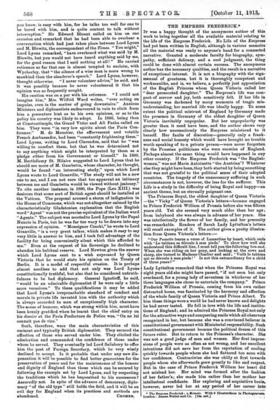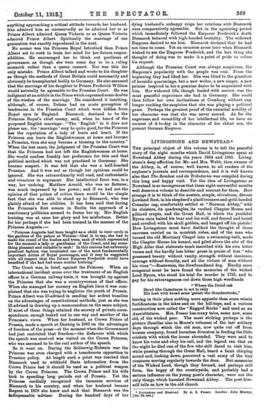THE EMPRESS FREDERICK.*
• The Empress Frederick : a Memoir. With 6 Illustrations in Photogravure, London : James Nisbet and Co. [15e. net.] IT was a happy thought of the anonymous author of this work to bring together all the available material relating to the life of the Empress Frederick. No Life of the Empress had yet been written in English, although in various memoirs all the material was ready to anyone's hand for a connected narrative. Granted a moderate faculty for biography, sym-
pathy, sufficient delicacy, and a cool judgment, the thing could be done with almost certain success. The anonymous author has the necessary qualities, and the result is a narrative of exceptional interest. It ie not a biography with the sign- manual of greatness, but it is thoroughly competent and
workmanlike, and is, we believe, a perfectly just appreciation of the English Princess whom Queen Victoria called her "dear persecuted daughter." The Empress's life was com- pact of sorrow and joy, both sensitively felt. If her life in Germany was darkened by many moments of tragic mis-
understanding, her married life was ideally happy. To some extent the political mistrust of England by Germany made the presence in Germany of the eldest daughter of Queen Victoria inevitably unpopular. But her unpopularity was greater than it need have been, and the author shows very clearly how unconsciously the Empress ministered to it herself. Her faults of discretion—generally only a frank- ness and social honesty which would have brought no trouble worth speaking of to a private person—were never forgotten by the Prussian politicians who were enemies of England. Perhaps almost the same thing would have happened in any other country. If the Empress Frederick was " the English- woman," was not Marie Antoinette "the Austrian"? Whatever else they might have been, they both started by being something that was not grateful to the political sense of their adopted countries. The tragedy of the unnecessary suffering in such circumstances is not, however, the less for the sufferer. This Life is a study in the difficulty of being Royal and happy—an ancient theme, but an eternally poignant one.
The Princess Royal, the eldest daughter of Queen Victoria —the " Vicky " of Queen Victoria's letters—became engaged to Prince Frederick William of Prussia before she was fifteen years old. Yet she seemed very much older than her age ; from babyhood she was always in advance of her years. She was intellectually the flower of her family, and her precocity was remarkable. Readers of Sarah Lady Lyttelton's letters will recall examples of it. The author gives a pretty illustra- tion from Queen Victoria's letters :—
" Our Pussette learns a verse of Lamartine by heart, which ends with Le tableau se deroule a mes pieds.' To show how well she understood this difficult line, I must tell you the following bon-mot. When she was riding on her pony, and looking at the cows and sheep, she turned to Madame Charlier and said : Voila le tableau qui se deroule a mes pieds ! ' Is not this extraordinary for a child of three years ?"
Lady Lyttelton remarked that when the Princess Royal was eight years old she might have passed, "if not seen but only overheard, for a young lady of seventeen in whichever of her three languages she chose to entertain the company." Prince Frederick William of Prussia, coming from his own rather
distracted home, was fascinated by the harmony and affection of the whole family of Queen Victoria and Prince Albert. To him these things were a world he had never known and delights
be had never tasted. He fell in love with the life and institu- tions of England; and he admired the Princess Royal not only for the attractive ways and conquering smile which all observers recognized in her, but because she was a convinced believer in
constitutional government with Ministerial responsibility. Such constitutional government became the political dream of this future ruler. But to return to the Princess's character. Shp was not a good judge of men and women. Her first impresr sions of people were as often as not wrong, and her excellent intentions did not save her from the reputation of cooling quickly towards people whom she had flattered too soon with her confidence. Contrariwise she was chilly at first towards people whom she afterwards grew greatly to like and respect.
But in the case of Prince Frederick William ber heart did not mislead her. Her mind was formed after the fashion of her father's; she made him rather than her mother her intellectual confidante. Her exploring and acquisitive brain, however, never led her at any period of her career into anything approaching a critical attitude towards her husband. She admired him as unreservedly as he admired her or as Prince Albert admired Queen Victoria or as Queen Victoria admired Prince Albert. Spiritually the marriage of one generation was exactly reproduced in the next.
No sooner was the Princess Royal betrothed than Prince Albert set to work to train her mind for her future respon- sibilities. He encouraged her to think out problems of governance, as though she were some day to be a ruling monarch rather than a queen consort. Nor was this the only mistake. Prince Albert talked and wrote to his daughter as though the methods of Great Britain could necessarily and obviously be transplanted bodily to Germany. He also assumed that the marriage of his daughter to Prince Frederick William would naturally be agreeable to the Prussian Court. He was indignant at an article in the Times which expressed some doubts of the wisdom of the marriage. He. considered it insulting, although, of course, Delane had an acute perception of tendencies in the Prussian Court which were hidden from Royal eyes in England. Bismarck, destined to he the Princess Royal's chief enemy, said, when he heard of the proposed English marriage : " The ' English ' in it does not please me; the ' marriage' may be quite good, for the Princess has the reputation of a lady of brain and heart. If the Princess can leave the Englishwoman at home and become a Prussian, then she may become a blessing to the country."
When the test came, the judgment of the Prussian Court was that the Princess had not left the Englishwoman at home.
She would confess frankly her preference for this and that political method which was not practised in Germany. She became suspect. It was felt that she was a half-hearted Prussian. And it was not as though her opinions could be ignored. She was extraordinarily well read, and enthusiastic and vivacious in argument. Her intellectual force was, in a way, her undoing. Matthew Arnold, who was no flatterer, was much impressed by her power; and if we had not the opinion of that prince of critics there would be the simple fact that she was able to stand up to Bismarck, who was plainly afraid of her abilities. It has been said that during
the Princess's first season in Berlin the approach of a reactionary politician seemed to freeze her up. Her English training was at once her glory and her misfortune. Better for her perhaps if she had been trained in the manner of the Princess Augusta:— "Princess Augusta had been taught as a child to Ural- cercle in the gardens of the palace at Weimar—that is to say, she had to make the round of the bushes and trees, each of which represented for the moment a lady or gentleman of the Court, and say some- thing pleasant and suitable to each! In this curious but extremely practical fashion was inculcated one of the most fundamentally important duties of Royal personages, and it may be suggested with all respect that the future Empress Frederick would have benefited if she had had some similar training."
The Court was, in brief, against the Princess. When an international incident arose over the treatment of an English officer in a German railway train, it was brought up against the Princess that she was a countrywoman of that officer. When she managed her nursery on English lines it was com- plained that she was trying to anglicize the youth of Prussia.
Prince Albert was ill-advised in sending her ardent homilies on the advantages of constitutional methods, just as she was ill-advised in drawing up a memorandum on the same subject.
If most of these things retained the secrecy of private corre- spondence, enough leaked out in one way and another of the Princess's views. When her husband, as Crown Prince of Prussia. made a speech at Dantzig in 1863 on the advantages of freedom of the press—at the moment when the Government had just restricted that freedom—the disfavour with which the speech was received was visited on the Crown Princess, who was assumed to be the real author of the speech.
So it went on. During the Schleswig-Holstein war the Princess was even charged with a treacherous opposition to Prussian policy. At length such a point was reached that Bismarck used to withhold State information from the Crown Prince lest it should be used as a political weapon by the Crown Princess. The Crown Prince and his wife took to spending long periods out of Prussia. Yet the Princess cordially recognized the immense services of Bismarck to his country, and when her husband became Regent in 1878 she knew and said that Bismarck was the indispensable adviser. During the hundred days of her
dying husband's unhappy reign her relations with Bismarck were comparatively agreeable. But in the agonizing period which immediately followed the Emperor Frederick's death Bismarck behaved with high-banded brutality. The widowed Empress desired to see him. Bismarck declared that he had not time to come. Yet an occasion arose later when Bismarck wished to see the Empress Frederick, and the last thing she thought of doing was to make it a point of pride to refuse his request.
Although the Prussian Court was always suspicious, the Empress's popularity with the people was real. From the beginning they had liked her. She was blind to the grandeur of heraldic quarterings, but a new writer, a new singer, a new painter inspired in her a genuine desire to be acquainted with him. Her widowed life, though loaded with sorrow, was the most peaceful experience she had in Germany. She could then follow her own inclinations at Cronbcrg without any longer exciting the suspicion that she was playing a political game. Perhaps the greatest proof of the essential nobility of her character was that she was never soured. As for the eagerness and versatility of her intellectual life, we have an earnest of it to-day in the character of her eldest son, the present German Emperor.















































 Previous page
Previous page